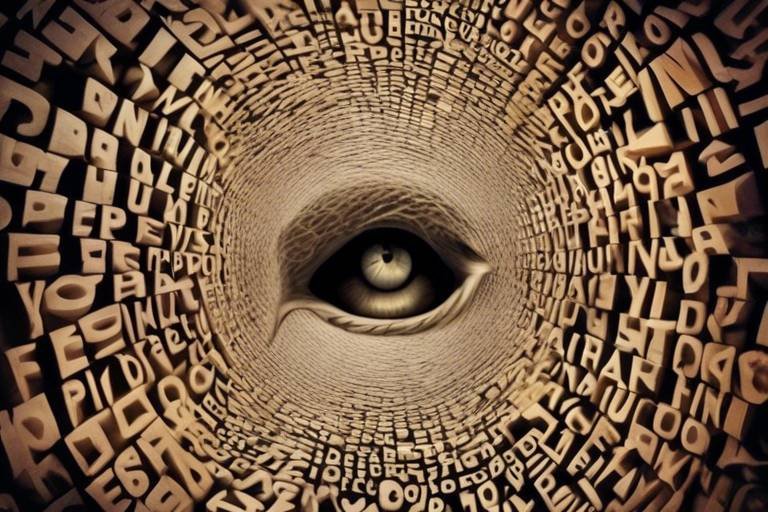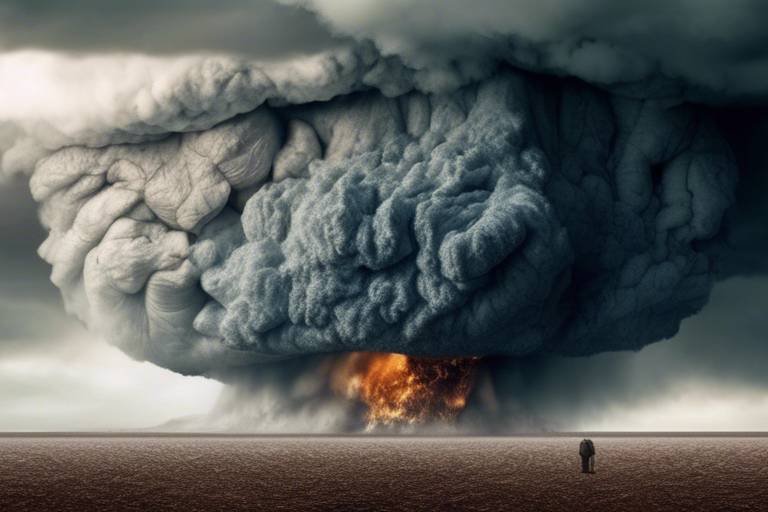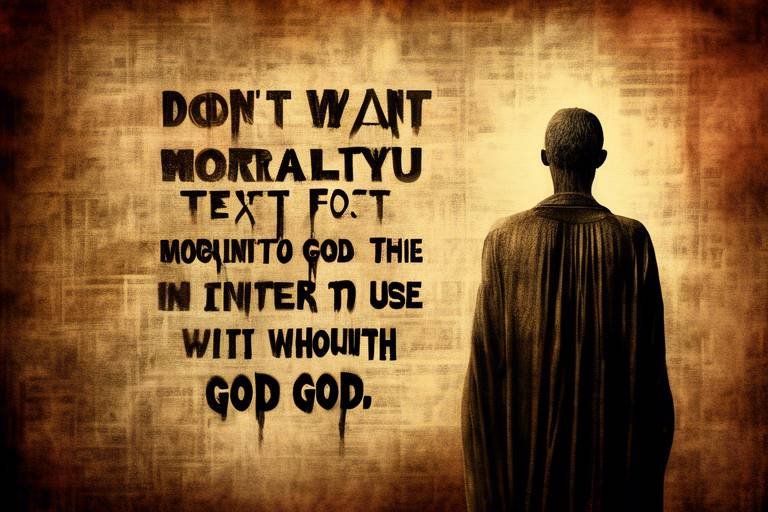The Metaphysics of Time Travel
Time travel has long been a tantalizing concept that dances on the edge of science fiction and philosophical inquiry. Imagine being able to hop into a machine and whisk yourself away to any moment in history or even into the distant future. It’s a captivating thought, isn't it? But beyond the fantasy lies a complex web of metaphysical questions that challenge our understanding of reality, existence, and the very fabric of time itself. In this article, we will explore the philosophical implications and theories surrounding time travel, examining its feasibility, paradoxes, and the nature of time.
The concept of time is not as straightforward as it seems. Many philosophers and scientists have debated its essence. Is time a linear progression from the past through the present and into the future, or is it more like a vast landscape where all moments coexist simultaneously? This philosophical exploration is crucial because it sets the stage for understanding the implications of time travel. As we delve into this topic, we will encounter various theories that challenge our conventional perceptions of time, revealing a universe that is far more intricate than we might have imagined.
One of the most intriguing aspects of time travel is how it forces us to confront our notions of causality and identity. If we could travel back in time, what would happen to the choices we made? Would we alter the course of history, or would we find ourselves entangled in a predestined loop? The questions are endless, and the answers are anything but simple. As we navigate through the different theories of time travel, we will also explore the paradoxes that arise, such as the grandfather paradox, which challenges the very foundation of our understanding of cause and effect.
Moreover, the implications of time travel extend beyond mere curiosity; they touch on the core of our existence. What does it mean to be us, if we can step outside of our time? How do our identities shift when we traverse different moments? These inquiries lead us into the realm of metaphysics, where the nature of reality is scrutinized. By examining the philosophical ramifications of time travel, we can gain deeper insights into our own lives and the choices we make.
As we proceed, we will also consider the future possibilities of time travel. With advancements in science and technology, what once seemed impossible might become a reality. Imagine a world where time travel is not just a figment of our imagination but a tangible experience. What ethical dilemmas would arise? How would society adapt to such a profound shift in understanding time and existence?
In summary, the metaphysics of time travel challenges our perceptions and invites us to ponder profound questions about time, identity, and reality. It is a journey that transcends the boundaries of science and philosophy, urging us to explore the very essence of what it means to exist in a world where time is not merely a linear path but a complex tapestry of moments waiting to be unraveled.
- Is time travel possible? While time travel remains a theoretical concept, scientific theories such as wormholes and quantum mechanics suggest it could be feasible under certain conditions.
- What are the main paradoxes of time travel? The grandfather paradox and the bootstrap paradox are two well-known conundrums that challenge our understanding of causality.
- How does time travel affect personal identity? Time travel raises questions about continuity and what it means to be the same person over time.
- What ethical implications does time travel have? Altering past events could have significant moral consequences, affecting not just individuals but future generations as well.

The Nature of Time
Understanding time is crucial for discussing the concept of time travel. Time is often perceived as a linear progression from the past to the present and into the future. However, philosophers and scientists have long debated its true nature. Is time something that exists independently of the events that occur within it, or is it merely a construct of human perception? To explore this question, we need to dive into various philosophical perspectives on time, including presentism, eternalism, and the block universe theory.
Presentism posits that only the present moment is real. According to this view, the past has ceased to exist, and the future is yet to come. Imagine standing at a bus stop; the only moment that matters is when the bus arrives. Everything else is just a memory or a possibility. This perspective aligns with our everyday experiences but raises questions about the existence of events that no longer have a tangible presence.
On the other hand, eternalism suggests that all points in time—past, present, and future—are equally real. This view can be likened to a movie reel, where every frame exists simultaneously, regardless of whether we are currently viewing it. This raises fascinating implications for time travel: if all moments exist at once, could we theoretically access any point in time?
Then there's the block universe theory, which combines elements of both presentism and eternalism. It suggests that time is a four-dimensional block where all events are laid out, much like a loaf of bread where each slice represents a different moment. In this view, the flow of time is an illusion, and our perception of it is merely a result of our consciousness moving through the block.
To further illustrate these concepts, consider the following table:
| Philosophical Perspective | Description | Implications for Time Travel |
|---|---|---|
| Presentism | Only the present is real. | Time travel would be impossible as the past and future do not exist. |
| Eternalism | All points in time are equally real. | Time travel could be feasible, allowing access to any moment. |
| Block Universe Theory | Time is a four-dimensional block. | Perception of time is an illusion; all moments exist simultaneously. |
These perspectives not only challenge our understanding of time but also set the stage for the complex discussions surrounding time travel. As we ponder these theories, it becomes clear that our grasp of time is not just a scientific inquiry but a profound philosophical exploration that could reshape our understanding of reality itself.

Time Travel Theories
When we dive into the realm of , we find ourselves standing at the crossroads of imagination and scientific inquiry. The very notion of traveling through time ignites a sense of wonder, but it also challenges our understanding of physics and reality. Several prominent theories have emerged, each presenting unique insights and implications. Let's explore some of the most fascinating concepts that may one day allow us to traverse the fabric of time.
One of the most intriguing theories is the idea of wormholes. These are hypothetical passages through spacetime that could act as shortcuts between two distant points in time and space. Imagine a tunnel connecting two different locations: one end is in the present, while the other could be in the past or future. The theoretical basis for wormholes stems from Einstein's theory of relativity, which suggests that spacetime can be warped and manipulated under certain conditions. However, the implications of using wormholes for time travel raise significant questions about causality—the relationship between cause and effect. If one could travel back in time, what would happen to the events that led to their journey?
Another compelling time travel theory involves the concept of time machines. These devices, often depicted in science fiction, suggest that it's possible to create a mechanism that allows individuals to move freely through time. The famous physicist Kip Thorne has even proposed a theoretical model for a time machine based on rotating black holes, known as a Gödel metric. However, the feasibility of constructing such a machine remains a topic of intense debate among scientists. The energy requirements and the technological advancements needed to create a stable time machine are staggering, leaving us to wonder if this is merely a dream of the future.
On a different front, quantum mechanics introduces a whole new perspective on time travel. The many-worlds interpretation suggests that every possible outcome of a quantum event actually occurs, creating a multitude of parallel universes. This theory implies that if one were to travel back in time and alter an event, they wouldn't necessarily change their own timeline; instead, they would create a new branch of reality. This raises fascinating questions about the nature of our choices and the existence of alternate timelines. Are we merely players in a grand cosmic play, or do we wield the power to shape our destinies across various dimensions?
To summarize, the theories of time travel invite us to rethink our understanding of reality and the universe. Whether through wormholes, time machines, or quantum mechanics, each theory presents its own set of challenges and wonders. As we continue to explore these concepts, we must also grapple with the profound implications they hold for our understanding of time itself.
- Can we really travel through time? - While time travel remains a theoretical concept, advancements in physics continue to explore its possibilities.
- What are wormholes? - Wormholes are hypothetical passages through spacetime that could connect different points in time and space.
- How does quantum mechanics relate to time travel? - Quantum mechanics introduces the idea of multiple realities, suggesting that changes in the past could create alternate timelines.
- Are time machines possible? - Theoretical models exist, but the technological and energy requirements are currently beyond our reach.

Wormholes and Their Implications
Wormholes, often depicted in science fiction as gateways to distant galaxies or alternate realities, are not just fanciful ideas; they are serious contenders in the realm of theoretical physics. These hypothetical passages through spacetime could potentially allow for time travel, creating a bridge between two disparate points in time and space. Imagine being able to step through a tunnel and emerge in the past or future—sounds like a plot twist in a blockbuster movie, right? But let's dive deeper into the implications of such extraordinary concepts.
The theoretical foundation of wormholes is rooted in the equations of general relativity proposed by Albert Einstein and Nathan Rosen. Their work led to the formulation of what we now call Einstein-Rosen bridges, which are essentially shortcuts through the fabric of spacetime. These bridges could connect two different locations in space and time, potentially allowing for instantaneous travel across vast distances or even temporal leaps. However, the idea of traversing these bridges raises significant questions about causality and the very structure of our universe.
One of the most compelling implications of wormholes is their potential to challenge our understanding of causality. If time travel were possible through a wormhole, it could lead to scenarios where cause and effect become muddled. For instance, if you traveled back in time and interacted with a past event, could you inadvertently change the course of history? This is where the concept of the butterfly effect comes into play, where even the smallest action in the past could have monumental consequences in the future. It’s a bit like dropping a pebble into a pond—those ripples can spread far and wide.
Moreover, the stability of wormholes presents another layer of complexity. Theoretical physicists suggest that while wormholes could exist, they may be inherently unstable. Imagine a bridge that only stays up for a fleeting moment; one wrong step could send you tumbling into oblivion. To keep a wormhole stable, it might require exotic matter—substances with negative energy density that we have yet to discover. This leads us to ponder: if we could create or find such matter, what other implications would it have for our understanding of the universe?
In summary, while wormholes open up a tantalizing array of possibilities for time travel and exploration, they also come with a host of implications that challenge our current understanding of physics. The interplay between time, causality, and the very fabric of reality remains a rich field for exploration. As we continue to probe the mysteries of the universe, who knows what we might discover about these enigmatic structures?
- What is a wormhole? A wormhole is a theoretical passage through spacetime that could create shortcuts between two distant points in the universe.
- Are wormholes real? While they are predicted by the equations of general relativity, no empirical evidence has yet been found to confirm their existence.
- Can we travel through a wormhole? Currently, the technology and understanding required to create or traverse a wormhole do not exist, and there are significant theoretical hurdles to overcome.
- What is exotic matter? Exotic matter is a hypothetical type of matter that would have negative energy density and could potentially stabilize a wormhole.
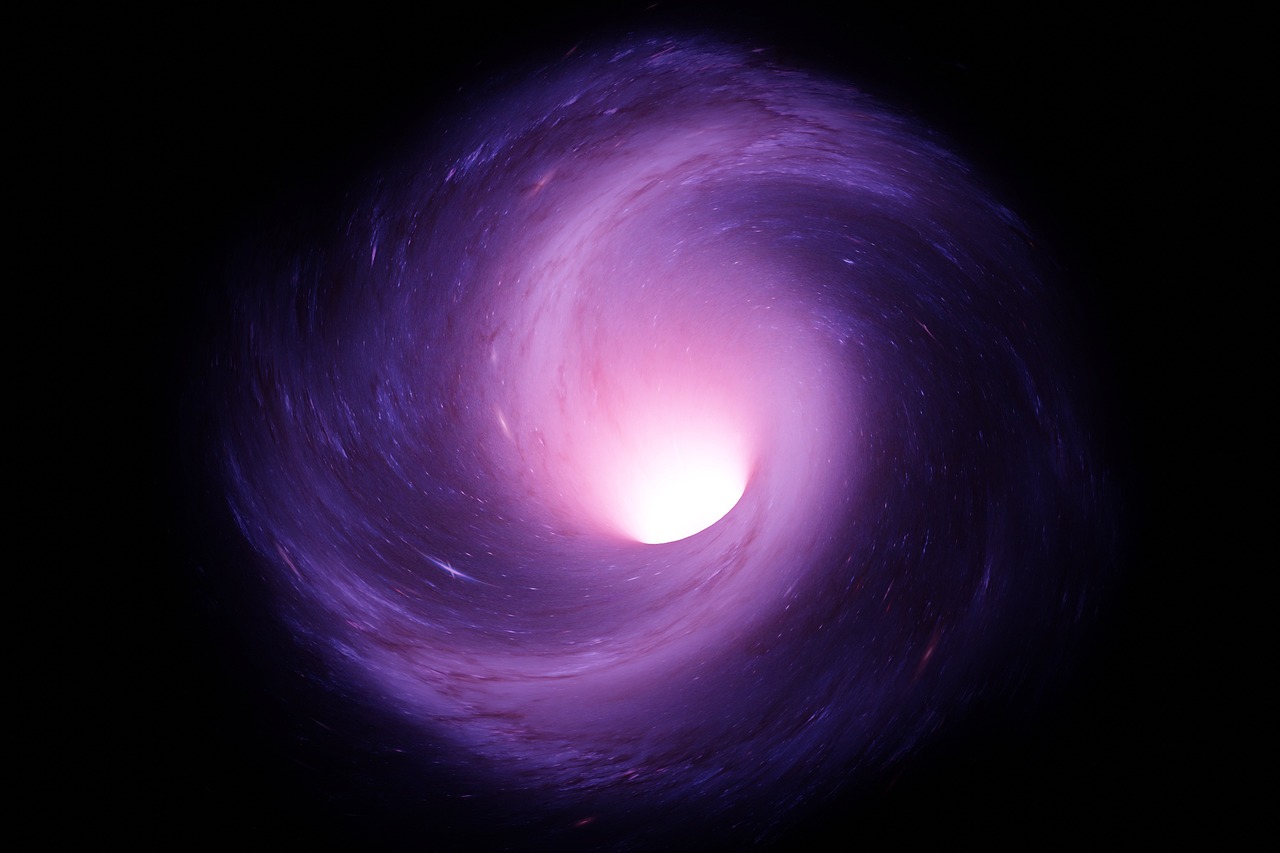
Einstein-Rosen Bridges
The concept of , often referred to as wormholes, is a captivating topic that merges the realms of physics and philosophy. Originating from the equations of general relativity, these theoretical constructs suggest the existence of shortcuts through spacetime. Imagine a tunnel that connects two distant points in the universe, allowing for instantaneous travel between them. This idea not only tantalizes the imagination but also poses profound questions about the nature of reality and time itself.
Einstein and his colleague, Nathan Rosen, proposed these bridges in 1935 as a way to illustrate the interconnectedness of the universe. They theorized that if such structures exist, they could potentially allow for travel between different points in time and space. This leads to fascinating implications, particularly regarding causality. If we could traverse these bridges, what would happen to our understanding of cause and effect? Would a traveler be able to alter past events, or would the universe find a way to maintain its timeline?
To better understand the implications of Einstein-Rosen bridges, let's consider a few key points:
- Connection of Spacetime: These bridges theoretically connect two separate points in spacetime, potentially allowing for time travel.
- Nature of Causality: The existence of such bridges raises questions about whether traveling back in time could alter past events.
- Scientific Basis: While grounded in general relativity, the practical realization of wormholes remains speculative.
However, the concept of Einstein-Rosen bridges is not without its challenges. One major obstacle is the question of stability. For a wormhole to be traversable, it must remain open and stable, which current theories suggest is unlikely without some form of exotic matter—matter that possesses negative energy density. This leads to a conundrum: if such matter exists, how can we harness it? The scientific community continues to explore these questions, grappling with the implications of these theoretical constructs.
In summary, Einstein-Rosen bridges offer a tantalizing glimpse into the possibilities of time travel and the nature of our universe. They challenge our understanding of not just physics, but also the very fabric of reality. As we continue to explore these concepts, we may uncover truths that reshape our understanding of time, space, and our place within the cosmos.
- What is an Einstein-Rosen bridge? An Einstein-Rosen bridge is a theoretical construct in general relativity that suggests a shortcut through spacetime, connecting two distant points.
- Can we travel through an Einstein-Rosen bridge? Currently, the concept remains purely theoretical, and there are significant scientific challenges that would need to be overcome for such travel to be possible.
- What are the implications of traveling through a wormhole? Traveling through a wormhole could potentially alter past events, raising questions about causality and the nature of time.

Challenges of Stability
When we dive into the fascinating world of wormholes and time travel, one of the first hurdles we encounter is the challenge of stability. Imagine trying to balance on a tightrope while juggling flaming torches; that’s how precarious the concept of a stable wormhole can be. Theoretically, wormholes are predicted by Einstein's general relativity, but their actual existence and functionality remain a hotbed of scientific debate. A wormhole, if it exists, must be kept open and stable long enough for a traveler to pass through, which raises a multitude of questions.
One of the primary concerns is that wormholes might collapse under the weight of gravity or the energy of anything trying to traverse them. This leads us to the concept of exotic matter, a hypothetical type of matter that possesses negative energy density. It's believed that such matter could help keep a wormhole open. However, the existence of exotic matter is purely speculative at this point, and we have yet to find any concrete evidence to support its existence. Without it, the dream of time travel remains just that—a dream.
Moreover, the mathematical formulations that describe wormholes often lead to solutions that are unstable. In simpler terms, once you create a wormhole, it might only exist for a fleeting moment before collapsing back into nothingness. This instability can be likened to trying to hold water in your hands; no matter how hard you try, some will always slip through your fingers. The laws of physics as we know them impose strict limitations, and these limitations are crucial in understanding why time travel remains a theoretical concept rather than a practical reality.
Additionally, the energy requirements for stabilizing a wormhole are beyond our current technological capabilities. To put it into perspective, the amount of energy needed could rival that of an entire star! This brings us to the question: Are we even close to achieving the technological advancements required for time travel? As of now, the answer is a resounding no, but the pursuit of knowledge continues to push the boundaries of what is possible.
In summary, while the idea of time travel through wormholes is exhilarating, the present significant obstacles. As scientists continue to explore the mysteries of the universe, we may one day find answers to these questions. Until then, the concept of stable wormholes remains an intriguing enigma, inviting us to ponder the possibilities of time and space.
- What is a wormhole? A wormhole is a hypothetical tunnel-like structure in spacetime that could connect distant points in time and space.
- Is time travel possible? While theoretically proposed through concepts like wormholes, time travel has not been practically demonstrated and faces numerous scientific challenges.
- What is exotic matter? Exotic matter is a theoretical form of matter that has negative energy density, which could potentially stabilize a wormhole.
- What are the implications of time travel? Time travel raises complex questions about causality, identity, and the nature of time itself.

Quantum Mechanics and Time Travel
When we dive into the realm of quantum mechanics, we enter a world that defies our everyday understanding of reality. Imagine a universe where particles can exist in multiple states at once, and the act of observation can alter their behavior. This bizarre nature of quantum mechanics opens up fascinating possibilities for time travel, challenging our conventional notions of time and causality. One of the most intriguing concepts that arises from quantum theory is the many-worlds interpretation. This theory posits that every decision we make creates a branching of realities, leading to a multiverse where all possible outcomes coexist. In this context, time travel could involve navigating through these parallel universes rather than simply moving through time as we understand it.
Consider this: if you traveled back in time and made a different choice, rather than changing your original timeline, you might simply create a new branch of reality. This notion raises profound questions about the nature of our choices and the fabric of existence itself. Are we mere players in a script that unfolds in a linear fashion, or do we have the power to rewrite our narratives by stepping into alternate realities? The implications of this theory extend beyond science fiction; they challenge our understanding of identity and existence.
Moreover, quantum entanglement introduces another layer of complexity to the discussion of time travel. In entangled systems, particles become interconnected in such a way that the state of one instantly influences the state of another, regardless of the distance separating them. This phenomenon suggests that information could potentially be transmitted instantaneously across time and space, hinting at the possible mechanisms through which time travel might occur. While these ideas may sound like something out of a sci-fi novel, they are grounded in rigorous scientific inquiry.
However, the path to harnessing quantum mechanics for time travel is fraught with challenges. The very nature of quantum states is inherently unstable, making it difficult to maintain a coherent timeline or reality. Additionally, the implications of interacting with alternate realities and timelines could lead to unforeseen consequences. As we ponder these complex ideas, we must ask ourselves: can we truly grasp the nature of time when our understanding is continually evolving? The intersection of quantum mechanics and time travel invites us to explore these questions and consider the profound implications for our understanding of the universe.
- What is quantum mechanics? Quantum mechanics is a fundamental theory in physics that describes the physical properties of nature at the scale of atoms and subatomic particles.
- How does the many-worlds interpretation relate to time travel? The many-worlds interpretation suggests that every decision creates a branching of realities, allowing for the possibility of navigating through alternate timelines when time traveling.
- What are the challenges of using quantum mechanics for time travel? The instability of quantum states and the potential consequences of interacting with alternate realities pose significant challenges for practical time travel.
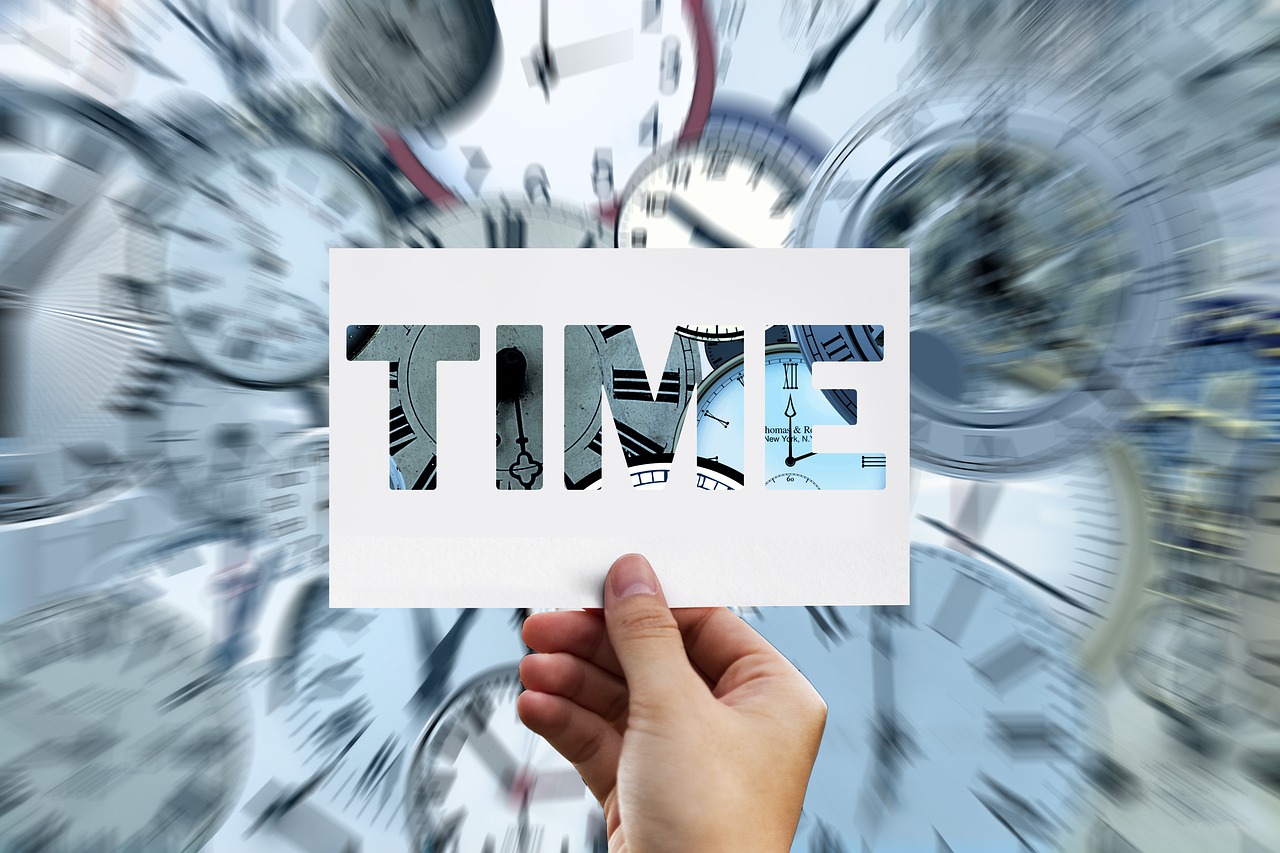
Paradoxes of Time Travel
Time travel is a concept that has fascinated humanity for centuries, not just in science fiction but also in serious philosophical discussions. However, with great fascination comes a plethora of paradoxes that challenge our understanding of time and causality. These paradoxes are not mere thought experiments; they raise profound questions about the nature of reality itself. Among the most notorious of these is the grandfather paradox, which questions the very fabric of our timeline and the consequences of altering past events. Imagine traveling back in time and inadvertently preventing your grandfather from meeting your grandmother. If you succeed, you would never be born, leading to a contradiction: if you were never born, how could you have traveled back in time in the first place?
This paradox illustrates the complexities of causality and the linearity of time. It's a classic example of how time travel could lead to a cascade of events that defy our conventional understanding of cause and effect. To explore this further, we can consider other paradoxes, such as the bootstrap paradox. This intriguing scenario involves an object or event that exists without a clear origin. For instance, if you were to travel back in time and give Shakespeare a copy of his own works, who is the true author? Did the works originate from Shakespeare, or did they come from you? This raises the question of whether time is truly linear or if it loops back on itself in ways we cannot fully comprehend.
Understanding these paradoxes is crucial for delving deeper into the philosophical implications of time travel. They challenge our intuitions about identity, free will, and the very nature of time. If we can change past events, what does that mean for our future? Are we merely puppets of fate, or do we have the power to alter our destinies? The answers to these questions remain elusive, but they are essential for grasping the broader implications of time travel.
As we venture further into the realm of time travel, we must grapple with these paradoxes and their implications. They serve as a reminder that while the idea of time travel may be thrilling, it also comes with a set of challenges that could reshape our understanding of the universe.
- What is the grandfather paradox?
The grandfather paradox is a theoretical scenario where a time traveler goes back in time and prevents their grandfather from meeting their grandmother, leading to a contradiction regarding the traveler's existence. - Can time travel exist without paradoxes?
Many theorists believe that if time travel were possible, it would require a different understanding of time that might avoid paradoxes altogether, such as the many-worlds interpretation of quantum mechanics. - What is the bootstrap paradox?
The bootstrap paradox occurs when an object or event exists without a clear origin, challenging our understanding of causality and the linear nature of time.
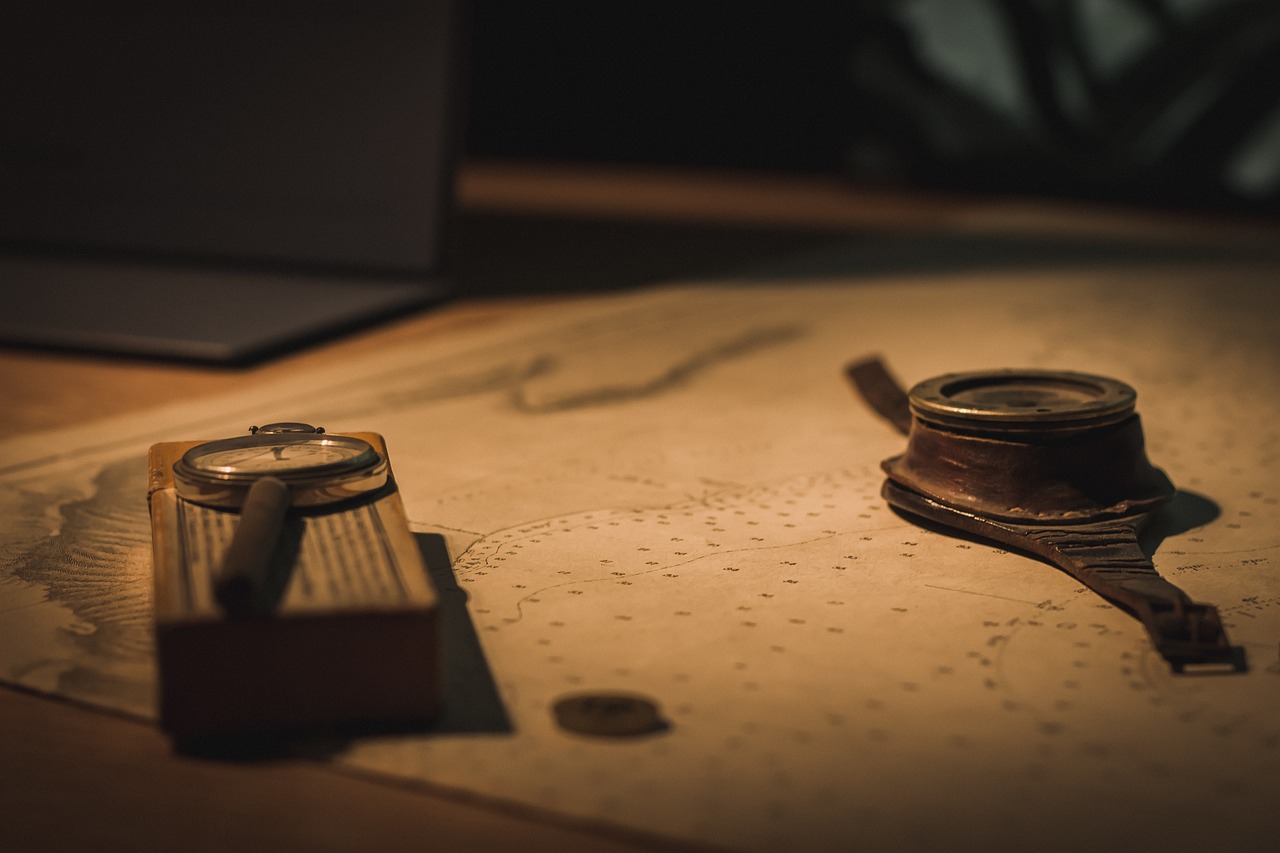
The Grandfather Paradox
The Grandfather Paradox is one of the most intriguing and perplexing conundrums in the realm of time travel. Imagine for a moment that you have the ability to travel back in time. You decide to visit your grandfather before he met your grandmother. In a twist of fate, you accidentally prevent your grandfather from ever meeting her, which means that your parent would never be born, and consequently, you would never exist. This paradox raises a fundamental question: If you never existed, how could you have traveled back in time to alter the past in the first place? This seemingly impossible scenario illustrates the complexities and contradictions inherent in the concept of time travel.
Philosophers and physicists have pondered the implications of this paradox for decades, leading to various proposed resolutions. Some suggest the idea of alternate timelines or parallel universes, where your actions in the past create a new timeline that diverges from the original, allowing you to exist in one reality while your original self never existed in another. This concept aligns with the many-worlds interpretation of quantum mechanics, suggesting that every decision or event creates a branching of realities.
Another resolution posits that time is not as linear as we perceive it. According to this view, all moments in time exist simultaneously, and altering the past does not necessarily negate your existence. Instead, your actions could be seen as part of a larger tapestry of events where everything is interconnected. However, this perspective raises further questions about free will and determinism: if the past is immutable, do we truly have the power to change our destiny?
To better understand the implications of the Grandfather Paradox, let's consider a table that summarizes some proposed solutions and their philosophical ramifications:
| Proposed Solution | Description | Philosophical Implications |
|---|---|---|
| Alternate Timelines | Time travel creates a new branch in the timeline, allowing different outcomes. | Challenges the concept of a single, linear timeline. |
| Simultaneous Existence | All moments in time exist at once; actions in the past do not negate existence. | Questions the nature of time and our understanding of causality. |
| Self-Consistency Principle | Any actions taken in the past must be consistent with the timeline, preventing paradoxes. | Suggests a deterministic view of time where events are preordained. |
Ultimately, the Grandfather Paradox serves as a fascinating lens through which we can explore the nature of time, causality, and existence. It invites us to question our understanding of reality and challenges the boundaries of our imagination. As we delve deeper into the metaphysics of time travel, we must confront these paradoxes, not just as theoretical exercises, but as profound inquiries into our own existence and the fabric of the universe.
- What is the Grandfather Paradox? The Grandfather Paradox is a thought experiment that questions the consequences of time travel, specifically what happens if a time traveler prevents their own existence.
- Are there solutions to the Grandfather Paradox? Yes, various solutions have been proposed, including alternate timelines, simultaneous existence, and the self-consistency principle.
- How does the Grandfather Paradox relate to free will? The paradox raises questions about free will and determinism, challenging our understanding of whether we can change our past or if our actions are predetermined.

The Bootstrap Paradox
The bootstrap paradox is one of those mind-bending concepts that makes you question the very fabric of time and causality. Imagine a scenario where an object or event exists without a clear origin. It’s like a never-ending loop, where the cause and effect are intertwined in such a way that you can’t pinpoint where it all began. This paradox challenges our traditional understanding of time and raises profound questions about the nature of existence itself.
To illustrate this, let’s consider a popular example: a time traveler goes back in time and hands Shakespeare a copy of his own works. Shakespeare, inspired by this mysterious book, writes the plays that we now attribute to him. However, if the time traveler got the works from Shakespeare in the first place, then who actually wrote them? This creates a circular causality that seems to defy logic.
At its core, the bootstrap paradox forces us to confront the following questions:
- What happens to the concept of authorship if an idea has no original source?
- How do we define the beginning of an event if it exists in a loop?
- Could our understanding of time be fundamentally flawed if we accept such paradoxes?
Philosophers and physicists alike have grappled with the implications of the bootstrap paradox. Some argue that it suggests a non-linear view of time, where events are not strictly sequential but rather interconnected in a complex web. Others propose that our understanding of causality may need to be redefined to accommodate such phenomena.
Furthermore, the bootstrap paradox opens up discussions about the nature of reality. If time travel were possible and such paradoxes could occur, what does that mean for our understanding of free will? Are our choices predetermined if they can lead to a situation where the outcome exists without a clear origin?
In summary, the bootstrap paradox is not just a quirky thought experiment; it challenges the very essence of how we perceive time, causality, and existence. As we delve deeper into the realms of time travel and its implications, we must remain open to the idea that our current understanding of the universe may only be scratching the surface.
- What is the bootstrap paradox?
The bootstrap paradox is a situation where an object or event exists without a clear origin, creating a loop in causality. - Can time travel actually create paradoxes?
Yes, time travel theories suggest that actions taken in the past could lead to paradoxical situations, such as the bootstrap paradox. - How does the bootstrap paradox affect our understanding of time?
It challenges the linear perception of time and suggests that events may be interconnected in complex ways. - Are there real-world implications of the bootstrap paradox?
While purely theoretical, the bootstrap paradox raises questions about authorship, free will, and the nature of reality.
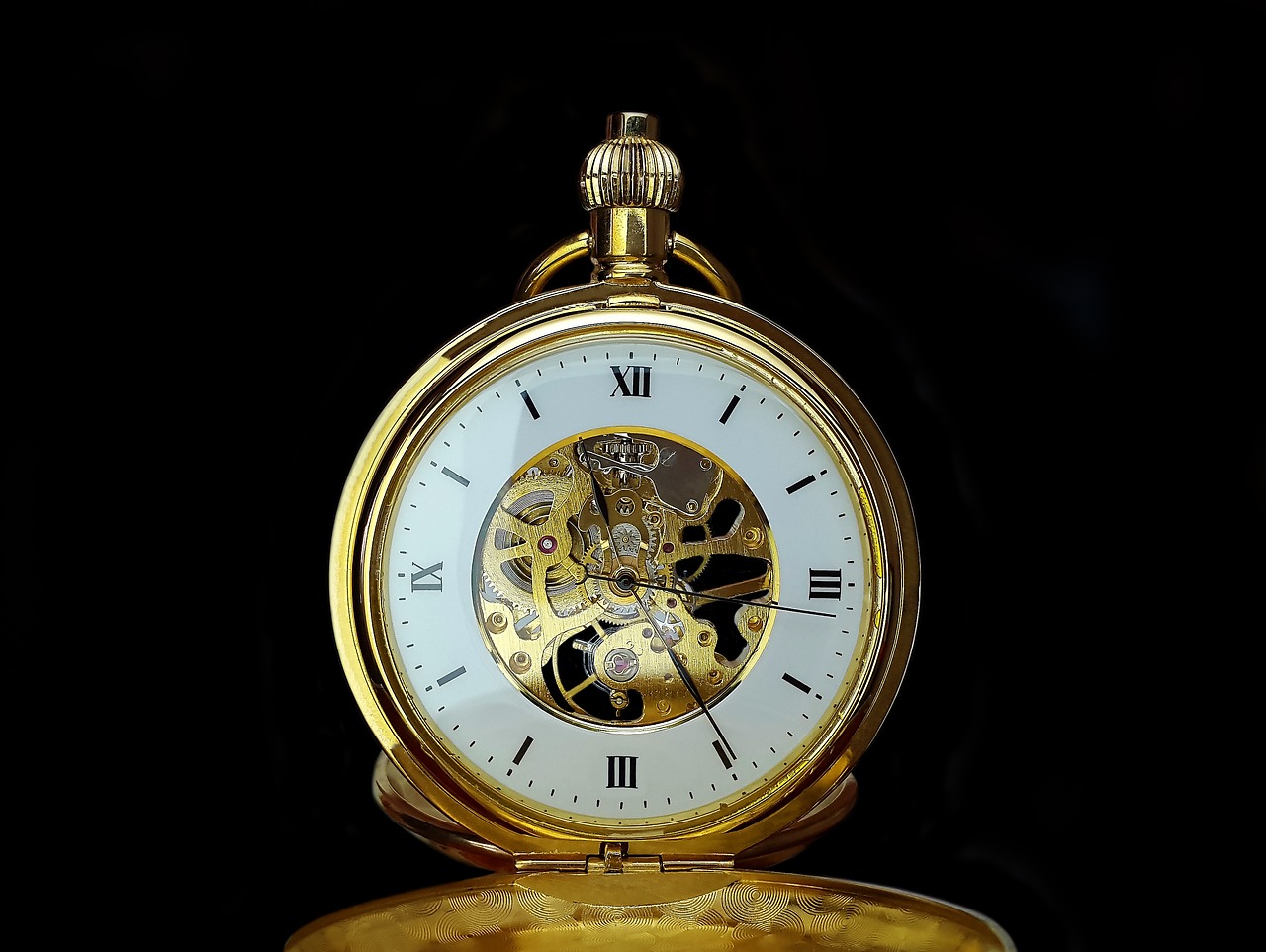
Philosophical Implications
The concept of time travel isn't just a playground for physicists and science fiction writers; it also opens a Pandora's box of that challenge our very understanding of existence. Imagine, for a moment, the implications of being able to traverse time. What does it mean for our identity, our free will, and the very fabric of reality? These questions aren't just theoretical musings; they strike at the core of what it means to be human.
One of the most profound implications revolves around identity over time. If you could visit your past self, would you still be the same person? This question taps into the philosophical debate about personal identity. Some argue that our identity is tied to our memories and experiences, while others suggest it is more about the continuity of our physical form. The idea of time travel complicates this notion significantly. For instance, if you were to change a pivotal moment in your life, would you still be you? Or would you become a different version, shaped by the new timeline you created?
Moreover, the intersection of time travel with free will and determinism presents a tantalizing dilemma. If time travel exists, does that mean our future is predetermined? Can we change events that have already happened, or are we merely playing out a script written by our past selves? This brings us to the concept of causality, where every action has a reaction. If you were to go back in time and prevent a significant event, like a historical catastrophe, would that make you a hero or a villain? The moral weight of such decisions is staggering.
To illustrate these philosophical implications, consider the following table that summarizes the key concepts:
| Concept | Description |
|---|---|
| Identity | How time travel affects our sense of self and continuity. |
| Free Will | The dilemma of choice when faced with the ability to alter past events. |
| Determinism | The question of whether our paths are set in stone or can be changed. |
As we ponder these questions, we must also consider the ethical implications of time travel. What responsibilities would come with the ability to change the past? Would it be ethical to prevent a tragedy at the cost of altering countless lives? The notion of a "time traveler" acting as a savior or a destroyer adds layers of complexity to our understanding of morality and ethics.
In conclusion, the philosophical implications of time travel are as vast and intricate as the universe itself. They challenge us to reconsider our beliefs about identity, free will, and the moral responsibilities that come with the power to alter time. As we continue to explore these ideas, we may find that the true journey is not just through time, but through the very essence of what it means to be human.
- Can time travel really exist?
While time travel remains a theoretical concept, scientific theories such as relativity suggest it might be possible under certain conditions. - What is the grandfather paradox?
This paradox questions what would happen if you traveled back in time and prevented your grandparents from meeting, thus preventing your own existence. - Does time travel affect personal identity?
Yes, time travel raises questions about how changes to the past could alter our identity and sense of self. - What ethical dilemmas arise from time travel?
Time travel could create moral dilemmas regarding the alteration of significant events and the consequences of such actions.

Identity Over Time
When we dive into the concept of , we find ourselves at the crossroads of philosophy, physics, and even a bit of science fiction. Imagine stepping into a time machine and zipping back to your childhood. You see your younger self playing in the yard, blissfully unaware of the complexities of adulthood. But here’s the kicker: if you interact with that child, does it change who you are today? This thought experiment opens a Pandora's box of questions about the nature of our identity.
To understand how time travel affects identity, we need to consider a few philosophical perspectives. One popular view is that personal identity is tied to continuity of consciousness. If you travel back in time and meet your past self, are you the same person? Or are you merely a different version of yourself, shaped by the experiences you’ve had since that moment? This leads us to the concept of the Ship of Theseus: if you replace every part of a ship, is it still the same ship? Similarly, if you could alter your past, would you still be you?
Another angle to consider is the relationship between memory and identity. Our memories are crucial to our sense of self. They shape our beliefs, our decisions, and our understanding of the world. But if time travel allows you to change past events, what happens to your memories? Would you remember things that never happened? This could create a scenario where you have conflicting memories, leading to a fractured sense of self. Imagine waking up one day with memories of a life you never lived—how unsettling would that be?
Furthermore, we can explore the implications of multiple timelines. In some theories of time travel, every action creates a new branch in the timeline. If you were to travel back and make a significant change, does that create a new version of you in a parallel universe? In this case, your original self continues to exist in one timeline, while a new version of you exists in another. This notion complicates our understanding of identity even further, as it raises questions about which version of you is “real” and how those versions relate to each other.
In summary, the concept of identity over time in relation to time travel challenges our traditional notions of who we are. It forces us to confront the idea that our identity is not a fixed point but rather a fluid and evolving construct. As we ponder these questions, we are reminded that our understanding of identity is as complex as the fabric of time itself.
- What is the Ship of Theseus? The Ship of Theseus is a philosophical thought experiment that questions whether an object that has had all its components replaced remains fundamentally the same object.
- Can time travel change who we are? Yes, time travel could potentially alter our experiences and memories, leading to different versions of our identities.
- What happens to memories if we change the past? If the past is altered, it could create conflicting memories, making it difficult to maintain a coherent sense of self.
- Are parallel universes a possibility with time travel? Some theories suggest that changes in the past could create new timelines, resulting in parallel universes where different versions of ourselves exist.
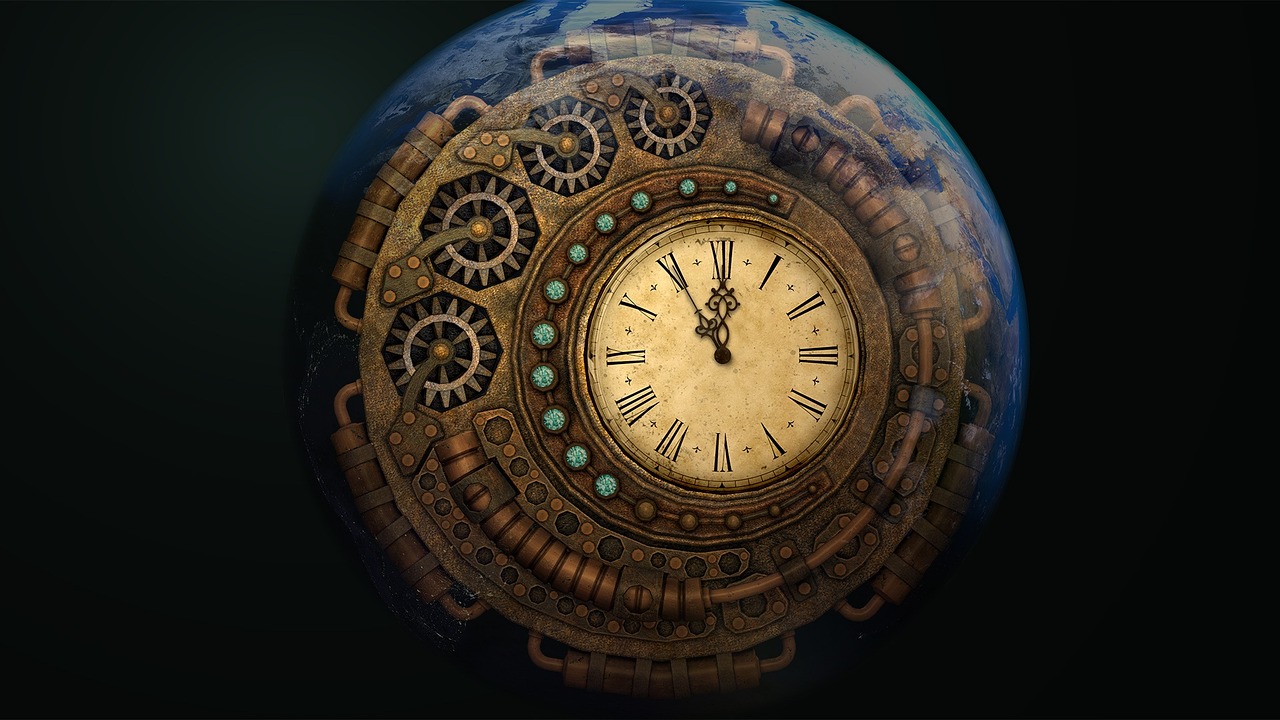
Free Will vs. Determinism
When we dive into the deep waters of time travel, we inevitably find ourselves grappling with the age-old debate between free will and determinism. Imagine standing at a crossroads, where every choice you make could ripple through time, altering not just your path but the very fabric of reality. This is where things get fascinating and, at times, downright perplexing.
On one side of the debate, we have determinism, the idea that every event or action is determined by preceding events in accordance with the natural laws. If everything is predetermined, then every moment in time is like a scene in a movie that has already been filmed. In this view, time travel becomes a bit of a paradox. If you were to travel back and change something significant, like preventing a historical event, would you merely be playing out a new scene that was always meant to happen? Or would you create an alternate timeline, diverging from the original?
Conversely, the concept of free will suggests that we have the power to make choices that can influence the future. This perspective allows for the possibility of altering past events without being bound by a predetermined script. Imagine a time traveler who decides to save a loved one from a tragic fate. In this scenario, they are exercising their free will, but at what cost? Could their actions lead to unforeseen consequences that spiral out of control, creating a chaotic timeline?
To further illustrate the tension between these two philosophies, consider the following table:
| Aspect | Determinism | Free Will |
|---|---|---|
| Nature of Choices | Pre-determined by past events | Independent and self-directed |
| Impact of Time Travel | Changes are part of a fixed timeline | Potential to create alternate realities |
| Philosophical Implications | Challenges the notion of personal responsibility | Empowers individuals to shape their destinies |
As we ponder these concepts, we must also consider the implications of time travel on our understanding of morality. If we can change the past, does that mean we have the right to do so? Are we morally obligated to intervene in historical events, or should we let the timeline unfold as it was meant to? These questions not only challenge our perceptions of free will and determinism but also force us to confront our ethical boundaries.
Ultimately, the intersection of time travel with free will and determinism is a rich ground for philosophical exploration. It pushes us to question the very nature of reality, our choices, and the consequences that ripple through time. As we continue to explore these ideas, we may find that the answers are as complex and multifaceted as time itself.
- Can time travel change the past? - Theoretically, yes, but it raises numerous paradoxes and ethical dilemmas.
- What is the grandfather paradox? - It's a famous time travel paradox where a time traveler could potentially prevent their own existence.
- Are free will and determinism mutually exclusive? - Not necessarily; some philosophers argue for compatibilism, where both can coexist.
- How does quantum mechanics relate to time travel? - Quantum mechanics introduces concepts like superposition and entanglement, which challenge classical notions of time.

Future Possibilities
As we stand on the edge of scientific discovery, the concept of time travel is not just a figment of science fiction; it’s a tantalizing possibility that may one day be within our grasp. With advancements in technology and our ever-evolving understanding of physics, the door to time travel might swing open sooner than we think. Imagine being able to visit the past, witness historical events firsthand, or even take a peek into the future! It’s a thought that can send shivers down your spine, isn’t it?
One of the most exciting aspects of this journey into the unknown is the potential for technological advancements. With innovations in quantum computing, artificial intelligence, and even space exploration, we are inching closer to unraveling the mysteries of time. For instance, quantum computers could simulate complex scenarios involving time travel, helping us understand the theoretical frameworks better. These advancements could pave the way for practical applications that challenge our current understanding of time and space.
Moreover, consider the implications of emerging technologies. Innovations such as gravitational wave detection and high-energy particle colliders could provide insights into the fabric of spacetime. As we delve deeper into the universe's secrets, we may uncover methods to manipulate time itself. It’s akin to discovering a new color in a painting where the possibilities are endless!
However, with great power comes great responsibility. The potential for time travel raises significant ethical considerations. If we could alter events in the past, what moral implications would arise? Would it be right to change a tragic event, knowing it could ripple through time and affect countless lives? These questions are not just philosophical musings; they are crucial for shaping the future of humanity. We must tread carefully, as the consequences of our actions could be monumental.
As we ponder these future possibilities, it’s essential to maintain a balance between curiosity and caution. The allure of time travel is undeniable, but we must also consider the ethical frameworks that guide our exploration. Will we be the architects of our destiny, or mere spectators in the grand theater of time? The answers to these questions may define the next chapter of human evolution.
In conclusion, the future of time travel is a blend of hope, excitement, and responsibility. As we continue to push the boundaries of science, we must also engage in thoughtful discussions about the implications of our discoveries. The journey ahead is filled with possibilities, and who knows? One day, we might just find ourselves stepping through the fabric of time!
- Will time travel ever be possible? While current scientific theories suggest it might be theoretically possible, practical time travel remains a subject of ongoing research.
- What are the major challenges of time travel? The stability of wormholes, energy requirements, and ethical considerations are some of the significant challenges that need to be addressed.
- How does quantum mechanics relate to time travel? Quantum mechanics introduces concepts like the many-worlds interpretation, which could provide a framework for understanding time travel.
- What ethical dilemmas could arise from time travel? Altering past events could have unforeseen consequences on the present and future, raising questions about morality and responsibility.

Technological Advancements
As we stand on the brink of a new era in science and technology, the dream of time travel seems less like a distant fantasy and more like a tantalizing possibility. Imagine a world where the boundaries of time are as malleable as those of space! This isn't just science fiction anymore; advancements in technology are paving pathways that could one day lead us to manipulate time itself. But how do we get there?
One of the most exciting developments comes from the field of quantum computing. Quantum computers, with their ability to process vast amounts of information simultaneously, could unlock new understandings of the universe. They might help us simulate complex models of spacetime, providing insights into how time travel could theoretically work. Think of it as having a supercharged calculator that can solve the most intricate equations in the blink of an eye!
Moreover, researchers are exploring the potential of artificial intelligence (AI) to assist in time travel research. AI algorithms can analyze immense datasets, identify patterns, and even predict outcomes based on historical data. This could lead to breakthroughs in how we understand time and its flow. What if AI could help us navigate the complexities of temporal mechanics, allowing us to foresee the implications of time travel before we even attempt it?
Another fascinating area of exploration is nanotechnology. As we develop the ability to manipulate matter at the atomic level, the possibilities for creating stable wormholes or other time travel mechanisms could become a reality. Imagine tiny machines that can rearrange particles to create a bridge through time! The implications of such technology are staggering.
Here's a quick overview of some technological advancements that could play a role in the future of time travel:
| Technology | Potential Impact on Time Travel |
|---|---|
| Quantum Computing | Ability to simulate complex spacetime models and solve intricate equations. |
| Artificial Intelligence | Analyzing data to predict outcomes and navigate temporal mechanics. |
| Nanotechnology | Manipulating matter at the atomic level to create stable wormholes. |
As we continue to innovate, we must also consider the ethical implications of these advancements. With great power comes great responsibility. The potential to alter the fabric of time could have unforeseen consequences, not just for the individual traveler but for the entire timeline of humanity. How do we ensure that we use such technology wisely? These are the questions that will shape our future as we delve deeper into the metaphysics of time travel.
As we explore the fascinating realm of time travel, it's natural to have questions. Here are some of the most common inquiries:
- Is time travel possible? While theoretical physics suggests it might be possible under certain conditions, practical time travel remains a topic of speculation.
- What are the major theories of time travel? Prominent theories include wormholes, Einstein-Rosen bridges, and concepts from quantum mechanics.
- What ethical concerns arise from time travel? Potential consequences of altering the past raise significant ethical dilemmas, including the impact on future generations.

Ethical Considerations
The concept of time travel isn't just a thrilling idea for science fiction fans; it also brings forth a myriad of ethical dilemmas that could resonate deeply within our moral framework. Imagine having the ability to travel back in time and alter significant events. Would you stop a war? Prevent a tragedy? Or perhaps, you would want to meet your ancestors? While these scenarios sound enticing, they also raise profound questions about the consequences of such actions.
One of the most pressing ethical issues surrounding time travel is the potential for unintended consequences. Every action taken in the past could ripple through time, creating changes that are impossible to predict. For instance, if someone were to prevent a historical figure from existing, what would be the implications for the future? Would their absence create a better world, or would it lead to unforeseen disasters? This idea is often encapsulated in the phrase, "a butterfly flaps its wings, and a hurricane forms on the other side of the world." The complexity of cause and effect in a time-altering scenario makes it difficult to ascertain the morality of our choices.
Moreover, we must consider the ethical implications of altering personal histories. If time travel were possible, individuals might be tempted to revisit their own pasts to correct mistakes or relive cherished moments. While this may seem harmless, it raises questions about personal growth and accountability. Would we lose our sense of self if we continually changed our past? Would we become trapped in a cycle of regret, forever seeking to rewrite our narratives? The philosophical implications of such actions challenge our understanding of identity and the lessons learned from our experiences.
In addition to personal ethics, there are broader societal considerations. If time travel became a reality, who would have access to it? Would it be a privilege reserved for the wealthy, or would it be available to everyone? The potential for inequality in accessing time travel technology could lead to significant societal divides. Those with the means to alter their pasts could potentially manipulate outcomes to their advantage, while others may remain powerless. This disparity raises crucial questions about justice and fairness in a world where time travel is possible.
Lastly, we cannot overlook the moral implications of interfering with historical events. The desire to change the past can stem from a noble intention, such as wanting to prevent suffering. However, the act of intervening in history could be viewed as a form of hubris—an overestimation of our ability to understand and control the complexities of time and reality. As we ponder these ethical considerations, it becomes clear that the implications of time travel extend far beyond the scientific realm; they delve into the very essence of what it means to be human.
- What are the main ethical concerns about time travel? The ethical concerns include unintended consequences, altering personal histories, societal inequality, and interfering with historical events.
- Could time travel lead to a better world? While it may seem possible to improve the world by changing the past, the unpredictability of consequences makes this a complex issue.
- Who would have access to time travel? Access to time travel could potentially create societal divides, favoring the wealthy and powerful.
- What does time travel mean for personal identity? Time travel raises questions about identity and continuity, as altering the past could change who we are today.
Frequently Asked Questions
- What is time travel?
Time travel refers to the concept of moving between different points in time, similar to how we move through space. It challenges our understanding of time and reality, raising intriguing questions about causality and the nature of existence.
- Is time travel scientifically possible?
While time travel remains a theoretical concept, certain scientific theories, like wormholes and quantum mechanics, suggest it might be feasible under specific conditions. However, significant challenges, such as stability and energy requirements, still need to be addressed.
- What are wormholes?
Wormholes are hypothetical passages through spacetime that could connect distant points in time and space. They are derived from Einstein's theory of general relativity and offer a fascinating glimpse into the potential for time travel.
- What are the major time travel paradoxes?
Some of the most discussed paradoxes include the grandfather paradox, which questions the consequences of altering past events, and the bootstrap paradox, where an object or event exists without a clear origin. Both challenge our understanding of causality.
- How does time travel affect personal identity?
Time travel raises complex questions about personal identity, as traveling to different times could alter our understanding of who we are. Philosophers debate whether our identity remains intact or changes based on our experiences in different timelines.
- What ethical concerns are associated with time travel?
The potential for time travel poses significant ethical dilemmas, such as the moral implications of altering past events. Questions arise about the consequences of our actions on future generations and the responsibility that comes with such power.
- Are there any technological advancements that could make time travel possible?
Emerging technologies in physics and engineering may provide new insights into time travel. Innovations in quantum mechanics and spacetime manipulation could reshape our understanding and potentially lead to practical applications in the future.



